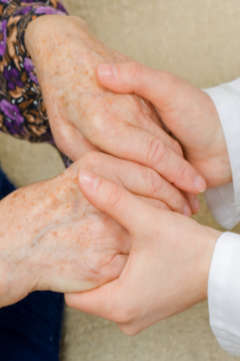 Alzheimer’s disease is a form of dementia that affects memory, reasoning and other mental abilities. The condition is most prominent among the older population, but early onset symptoms can affect younger adults.
Alzheimer’s disease is a form of dementia that affects memory, reasoning and other mental abilities. The condition is most prominent among the older population, but early onset symptoms can affect younger adults.
Although it takes an average of 15 years before your loved one shows symptoms of Alzheimer’s, signs become more prominent three to five years before an official diagnosis.
Researchers have not determined the official cause, yet some individuals experience symptoms after a stroke. Brain scans can help indicate if Alzheimer’s is present but cannot predict future development.
If your family member has started to forget things, has trouble making decisions or engaging in conversation, consider the following points.
Talk with Your Loved One
Initially, your loved one may be closed off, become angry or deny any changes. Although it’s best to approach the discussion on their terms, don’t wait too long.
Once cognitive decline sets in, he or she should be receiving medical attention. If the refusal continues, you may need to approach a medical professional yourself about an evaluation.
Get Him or Her Evaluated
No single test pinpoints if a person has Alzheimer’s disease. Instead, your loved one will be evaluated for a combination of symptoms that correlate with this condition, including perception and reasoning skills.
In the process, the doctor may rule out other diseases that have similar symptoms, including malnutrition and vitamin deficiencies, metabolic disorders, infections, alcohol abuse and depression. Bring a list of medications your loved one currently takes to help ensure the symptoms are not a side effect.
The doctor will also assess your loved one’s health history and perform a physical examination. If a pattern of symptoms becomes evident, your loved one may be referred to a neurologist, geriatric or dementia specialist for additional medical evaluation.
What to Do After Diagnosis
Post-diagnosis, your loved one will have a new routine. Whether you’re the caretaker or a family member in close contact, you’ll be working together through this transition:
- Your loved one may need to go on medication. Doctors may prescribe certain medicines to help with memory loss, reduce agitation and anxiety or improve sleep.
- Your loved one needs to be in regular contact with a doctor. Routine visits help determine if a change in mental state is related to Alzheimer’s or another condition.
- Think about your role as a caretaker. You want to be there for your loved one as much as possible, but burnout makes you less effective. Consider caretaker training to manage certain behaviors and improve communication. Seek support from others and avoid neglecting your personal health.
As dementia progresses, a professional environment may better suit your loved one’s needs. West Hartford Health & Rehabilitation Center is a skilled nursing facility with trained Alzheimer’s care providers. To learn more about our services, contact us today.

